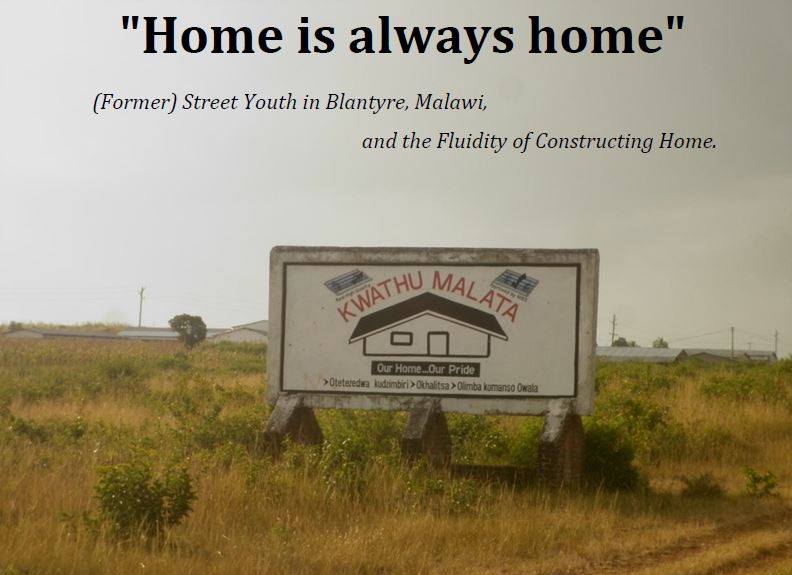Winner Africa Thesis Award 2016: Tanja Hendriks: ‘Home is always home’. (Former) Street Youth in Blantyre Malawi and the Fluidity of Constructing Home

On behalf of the jury, the ASCL is pleased to announce that the winner of the Africa Thesis Award 2016 is Tanja Hendriks for her thesis ‘Home is always home’. (Former) Street Youth in Blantyre Malawi and the Fluidity of Constructing Home. Tanja Hendriks completed the Research Master in African Studies at Leiden University and graduated cum laude early 2016. The prize will be presented to Tanja at the LeidenASA Annual Meeting on Thursday 8 December (on invitation).
Read the full text of the thesis.
About the thesis
For many Malawians the concept of home is strongly associated with the rural areas and one’s (supposedly rural) place of birth. This ‘grand narrative about home’, though often reiterated, doesn’t necessarily depict lived reality. Malawi’s history of movement and labor migration coupled with contemporary rapid urbanization makes that the amount of people whose lives do not fit this grand narrative, is increasing fast. In the current context of extreme poverty, destitution and devastation – the latter due to the flash floods of January 2015 – slum areas in Blantyre city are growing and so is the number of street children and youth. Some of them are taken in by organizations such as the Samaritan Trust; a street children shelter. This program aims at taking street youth home by ‘reintegrating’ them in their (rural) communities. When asked, the majority of (former) street youth adhere to the grand narrative and state their home to be in a rural village. Yet at the same time, this home is a place they intentionally left and do not wish to (currently) return to. Hence they are generally depicted as ‘homeless’. Hendriks wondered: how do (former) street youth in Blantyre, Malawi, engage with ‘the grand narrative about home’ in trying to imagine their ‘becoming at home’ in the city?

Her thesis departs from the idea that (the search for) home is an integral part of the human condition. During eight months of ethnographic fieldwork in Blantyre, Malawi, she used qualitative methods – mainly interviews and participant observation – to come to an understanding of the meaning of home for (former) street youth. Some of them, the street girls, currently reside at Samaritan Trust and the former street youth are boys who formerly resided there. Their home-making practices in relation to a marginalized socio-economic position in an overall challenging economic context point towards more fluid and diverse constructions of home that exist alongside the grand narrative without rendering it obsolete. Under pressure, (former) street youth paradoxically attempt to solidify home – even though home remains fluid in practice. These attempts assist in coping with life in liquid modernity while they are at the same time fraught with contradictions, especially when these solidifications are themselves solidified in policies. These policies subsequently hamper (former) street youth’s becoming at home in town by following the grand narrative and thus confining their homes to rural areas. Hendriks concludes that home can best be seen as a fluid field of tensions (re)created in the everyday, thus leaving space for both (former) street youth’s roots and routes. An alternative way in which (former) street youth try to become at home in the city is by searching for a romantic partner to co-construct this (future) home with.
About Tanja Hendriks
Tanja Hendriks holds a bachelor’s degree in Cultural Anthropology (2012) and a master’s degree in International Development Studies (2015) from the University of Amsterdam. For the latter she conducted fieldwork in Burundi, focusing on primary school-aged children and the intergenerational transmission of violence and resilience. In 2016 she graduated from Leiden University, having completed the Research Master African Studies. Her main research interests include storytelling, Malawi, ethnography, philosophy of science, linguistic anthropology and the politics of language. After graduating she worked as a research assistant, assisting Saskia Vossenberg (PhD) with her fieldwork in Malawi on business women, entrepreneurship and inclusive development.
Since August 2016 she has been working for the ASCL as a junior researcher on labour relations and informal workers’ organizations in the informal economy in Accra, Ghana. Her research is part of the NWO-funded project within the framework of the INCLUDE research programme: Increasing Political Leverage of Informal and Formal Workers’ Organizations for Inclusive Development: The cases of Ghana and Benin.
Runners-up
This year 42 theses were submitted for the Africa Thesis Award. The jury would like to make a special mention of Leonor Faber-Jonker's thesis 'More than just an object': a material analysis of the return and retention of Namibian skulls from Germany. Faber graduated cum laude in the Research Master in Modern History at Utrecht University.
The other runners-up for the Africa Thesis Award 2016 were (in alphabetical order): Seun Abimbola, University of Ibadan, Nigeria: The legend of Ajala’s travels and transnational backpacking in Africa; and Silvana Gamboa Palacios, University of Groningen: Assessment of electricity demand-supply in health facilities in resource-constrained settings : optimization and evaluation of energy systems for a case in Rwanda.
The jury
The ASCL wishes to thank the jury of the 2016 Africa Thesis Award for the careful reading of all theses and their well thought through final decision:
- Dr Nicky Pouw (University of Amsterdam) (chair)
- Dr Akinyinka Akinyoade (African Studies Centre Leiden)
- Drs Wim Brummelman (journalist NRC)
- Ms. Likoko Eunice (PhD fellow, University of Amsterdam)
- Dr Karin Nijenhuis (African Studies Centre Leiden)

